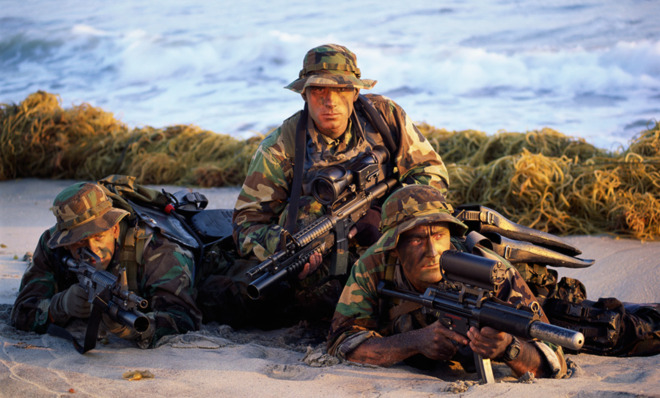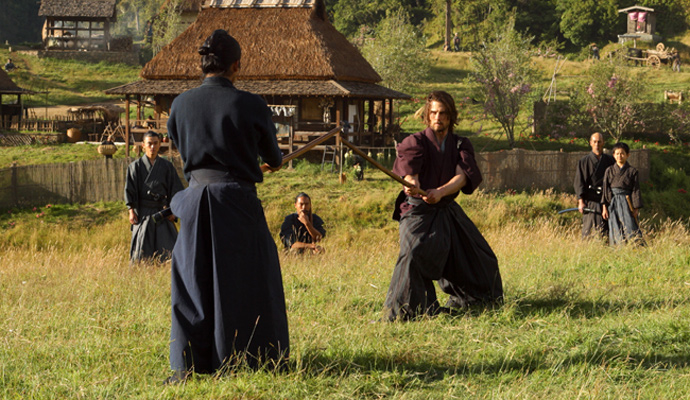The secret to handling pressure like astronauts, Navy SEALs, and samurai
150 miles above the Earth is no place for panic

A free daily email with the biggest news stories of the day – and the best features from TheWeek.com
You are now subscribed
Your newsletter sign-up was successful

We all make a lot of bad decisions.
With careers:
More than half of teachers quit their jobs within four years. In fact, one study in Philadelphia schools found that a teacher was almost two times more likely to drop out than a student. [Decisive: How to Make Better Choices in Life and Work]
In our jobs:
The Week
Escape your echo chamber. Get the facts behind the news, plus analysis from multiple perspectives.

Sign up for The Week's Free Newsletters
From our morning news briefing to a weekly Good News Newsletter, get the best of The Week delivered directly to your inbox.
From our morning news briefing to a weekly Good News Newsletter, get the best of The Week delivered directly to your inbox.
A study showed that when doctors reckoned themselves "completely certain" about a diagnosis, they were wrong 40% of the time. [Decisive: How to Make Better Choices in Life and Work]
And in our personal lives:
…an estimated 61,535 tattoos were reversed in the United States in 2009. [Decisive: How to Make Better Choices in Life and Work]
So how can we all make better decisions? When life and death is on the line what methods do the pros consistently rely on?
It's "arousal control."
That's a fancy word for keeping a cool head. Ever been so angry — or so happy — you can't think straight? Exactly.
A free daily email with the biggest news stories of the day – and the best features from TheWeek.com
In their book, Decisive, Chip and Dan Heath identify short term emotion as one of the primary causes of bad decisions.
Astronauts, samurai, Navy SEALs, and psychopaths. What can you learn from them about staying calm and making good decisions under pressure?
150 miles above the Earth is no place for panic
It's the 1960's and NASA is going to send people to the moon for the first time. A million things could go wrong.
How do you make sure astronauts don't freak out in the cold darkness of space where there's no help?
Ryan Holiday, author of The Obstacle is The Way, wrote about the challenges faced by the first moon landing crew:
When America raced to send the first men into space, they trained the astronauts in one skill more than in any other: the art of not panicking.
When people panic, they make mistakes. They override systems. They disregard procedures, ignore rules. They deviate from the plan. They become unresponsive and stop thinking clearly. At 150 miles above Earth in a spaceship smaller than a VW, this is death. Panic is suicide. [The Obstacle is The Way]
You're NASA. What do you do?
The research shows one of the key ways to fight panic is to have a feeling of control.
Anything that provides a feeling of control will improve performance and help you make better decisions when things go sideways.
And that's exactly what NASA did. They systematically and repeatedly put the astronauts through everything they'd experience while in space.
This level of familiarity produced a powerful feeling of confidence:
Before the first launch, NASA re-created the fateful day for the astronauts over and over, step by step, hundreds of times — from what they'd have for breakfast to the ride to the airfield. Slowly, in a graded series of "exposures," the astronauts were introduced to every sight and sound of the experience of their firing into space. They did it so many times that it became as natural and familiar as breathing. [The Obstacle is The Way]
This is why when top bomb disposal experts approach a bomb their blood pressure actually goes down. Control and confidence.
(More on what we can learn from astronauts here.)
Okay, I know what you're thinking: NASA had a billion dollars, the smartest people in the world and lots of time. I don't, Eric.
I'm with you. But this same focus on arousal control has worked for almost a thousand years, with far fewer resources. Here's how.
The most important samurai training doesn't involve a sword

What does the baddest samurai to ever carry a katana have to say about warfare? Stay calm:
Both in fighting and in everyday life you should be determined though calm. Meet the situation without tenseness yet not recklessly, your spirit settled yet unbiased. [The Book of the Five Rings]
Like astronauts, samurai knew the power of a feeling of control through training. But they had another trick up their sleeve.
Emotional preparation. Ryan Holiday explains:
This is why Musashi and most martial arts practitioners focus on mental training as much as on physical training. Both are equally important — and require equally vigorous exercise and practice. [The Obstacle is The Way]
What did they do? Specifically, they thought about death. A lot. (No, I'm not recommending you get all emo. Stay with me.)
Thinking about the worst (and in their case it was having your head separated from your body) can help you be calm and rational.
The Stoics did it, the samurai did it, and every time you say "What's the worst that could happen?" you do it too — whether you know it or not.
(More on samurai methods for calm here.)
So these methods may have worked 1000 years ago, they may have worked in the 1960′s… but isn't the world different in the 21st century?
No. No, it's not. And the elite Navy SEALs are proof.
What's special about special forces
Go without food or sleep for days. Jump out of a plane at 35,000 feet. Trade gunfire with al Qaeda in the mountains of Afghanistan while outnumbered.
This is not what Navy SEALs call a nightmare. It's what they call "Thursday."
Kevin Dutton and his friend, Andy (a former SAS soldier — the British equivalent of a SEAL) had their vital signs monitored during a study.
Both were similar under normal circumstances. But what happened when they were exposed to stimuli that screamed "DANGER! TIME TO PANIC!"?
Dutton's brain went wild with fear. But his friend Andy's response was very, very different:
His pulse rate begins to slow. His GSR begins to drop. And his EEG to quickly and dramatically attenuate. In fact, by the time the show is over, all three of Andy's physiological output measures are pooling below his baseline. Nick [the researcher] has seen nothing like it. "It's almost as if he was gearing himself up for the challenge," he says. "And then, when the challenge eventually presented itself, his brain suddenly responded by injecting liquid nitrogen into his veins. Suddenly implemented a blanket neural cull of all surplus feral emotion. Suddenly locked down into a hypnotically deep Code Red of extreme and ruthless focus." He shakes his head, nonplussed. "If I hadn't recorded those readings myself, I'm not sure I would have believed them," he continues. "Okay, I've never tested Special Forces before. And maybe you'd expect a slight attenuation in response. But this guy was in total and utter control of the situation. So tuned in, it looked like he'd completely tuned out." [The Wisdom of Psychopaths]
Elite military units vet for the toughest characters. And they go through punishing training. But what silly little thing makes a huge difference?
Breathing. Yeah, breathing.
Teaching recruits to monitor their breathing helped increase Navy SEAL passing rates from 25 to 33 percent.
Research shows meditation-style breathing can make you courageous, increase your attention span, and even boost happiness,
(More on the other three things that improved the performance of Navy SEALs here.)
At this point you might feel like emotions are a total liability. Like effective decision making means you have to be the Terminator 24/7.
Nope. Let's learn about how to balance cold rationality with the power of emotion. Let's look at psychopaths.
What you can learn from stone cold killers
What does it mean to be a psychopath? Often it means a congenital lack of empathy.
So psychopaths aren't raving and wild-eyed. Actually, in many ways they're overly rational.
When researchers make people play a betting game, who acts logically and isn't swayed by irrational (but common) fears?
Yup, psychopaths:
"This may be the first study," comments George Loewenstein, professor of economics and psychology at Carnegie Mellon, "that documents a situation in which people with brain damage make better financial decisions than normal people." [The Wisdom of Psychopaths]
You may want your stockbroker to be a psychopath. Seriously:

The most successful stockbrokers might plausibly be termed 'functional psychopaths'— individuals who on the one hand are either more adept at controlling their emotions or who, on the other, do not experience them to the same degree of intensity as others. [The Wisdom of Psychopaths]
(More on which professions have the most psychopaths here.)
Oh, and I guess I should also mention some psychopaths, um, murder people…
So being extremely rational often leads to better decisions — but without some empathy it can also lead to some very bad things.
This might seem confusing. How do you know just how rational to be?
For best results, add empathy
There's a reason why they give it the name "arousal control." You're not trying to kill your emotions, you just want a leash on them.
You don't want to be incapable of empathy. In fact, empathy, when controlled, can be an enormous positive when trying to make good decisions.
We always think of doctors as very rational. But research shows doctors who feel empathy make better decisions.
Wharton professor and author of Give and Take, Adam Grant explains:
There is a great study of radiologists by Turner and colleagues showing that when radiologists just saw a photo of the patient whose x-ray they were about to scan, they empathized more with the person, seeing that person as more of a human being as opposed to just an x-ray. As a result, they wrote longer reports, and they had greater diagnostic accuracy, significantly. [Barking up the Wrong Tree]
At this point you may be saying: Okay, okay, I've kept my cool — but what do I do now?
What's fascinating is that same empathy also leads us to the next step of great decision making: think about others.
The best, simplest method for making better decisions once you have a clear head is called "taking the outside perspective."
What's that mean? Ask yourself, "What advice would I give my best friend in this situation?"
Duke professor and author of Predictably Irrational, Dan Ariely explains:
If I had to give advice across many aspects of life, I would ask people to take what's called "the outside perspective." And the outside perspective is easily thought about: "What would you do if you made the recommendation for another person?" And I find that often when we're recommending something to another person, we don't think about our current state and we don't think about our current emotions. [Barking up the Wrong Tree]
So where does all this lead us?
Next stop: Wisdom
The five step process for making better decisions:
1. Maintain a feeling of control over your situation.2. Emotional preparation. Consider how things could be worse.3. Monitor your breathing.4. Controlled empathy.5. Ask "What advice would I give my best friend in this situation?"
Can this style of decision making, over time, lead us to being not just smarter but wiser?
Actually, it may be the only system that can. We usually associate wisdom with knowledge, experience, or smarts. But what does the research say?
Yeah, those things are all important — but we underestimate how much wisdom is about understanding feelings:
In his valedictory work on wisdom, Baltes attributed the acquisition of wisdom to a variety of factors—general intelligence and education, early exposure to meaningful mentors, cultural influences, and the lifelong accumulation of experience, which is the centerpiece of developmental psychology. But he, too, acknowledged the central importance of emotional intelligence, noting that "there is good reason to assume that people capable of effectively regulating emotional states associated with dilemmas of life by cognitive rather than affective-dysfunctional modes might have a better chance of being considered wise or scoring high on wisdom tasks." [Wisdom: From Philosophy to Neuroscience]
We're not robots.
We're fundamentally emotional creatures and forgetting that fact is a huge mistake.
We place so much emphasis on logic and yet the best decisions come from understanding our emotions and considering what is best for others.
Join 85K+ readers. Get a free weekly update via email here.
More from Barking Up The Wrong Tree...
-
 6 of the world’s most accessible destinations
6 of the world’s most accessible destinationsThe Week Recommends Experience all of Berlin, Singapore and Sydney
-
 How the FCC’s ‘equal time’ rule works
How the FCC’s ‘equal time’ rule worksIn the Spotlight The law is at the heart of the Colbert-CBS conflict
-
 What is the endgame in the DHS shutdown?
What is the endgame in the DHS shutdown?Today’s Big Question Democrats want to rein in ICE’s immigration crackdown